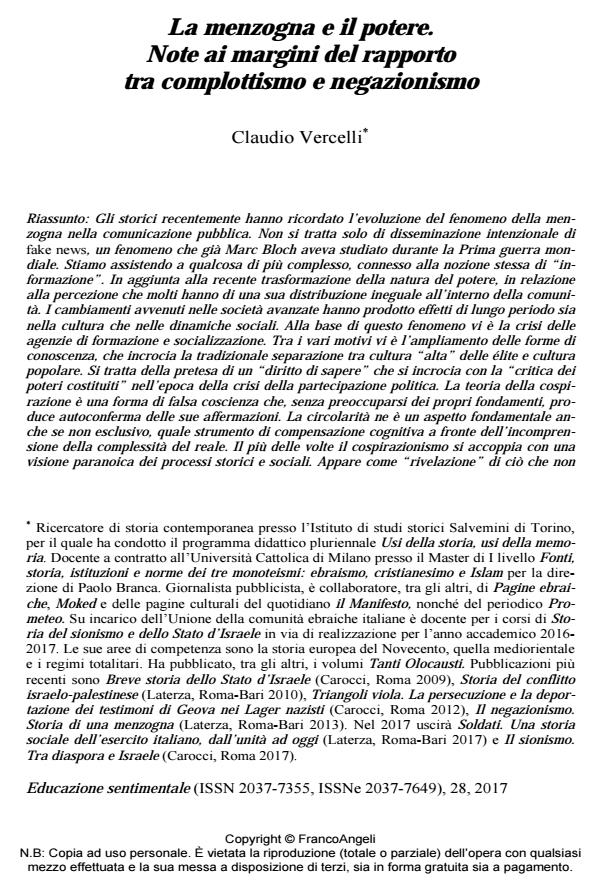Lie and power, Notes on the relations between plot theory and denial of history
Journal title EDUCAZIONE SENTIMENTALE
Author/s Claudio Vercelli
Publishing Year 2017 Issue 2017/28
Language Italian Pages 21 P. 13-33 File size 237 KB
DOI 10.3280/EDS2017-028003
DOI is like a bar code for intellectual property: to have more infomation
click here
Below, you can see the article first page
If you want to buy this article in PDF format, you can do it, following the instructions to buy download credits

FrancoAngeli is member of Publishers International Linking Association, Inc (PILA), a not-for-profit association which run the CrossRef service enabling links to and from online scholarly content.
Historians, as well as many scholars or researchers of human sciences, have in recent years recorded the evolution of the phenomenon of lies in the field of public communications. It is not only the deliberate dissemination of fake news - a phenomenon that Marc Bloch had al-ready investigated in its many implications during the First World War. We are looking at something more complex and composite, linked to the very change of the notion of "infor-mation" from the time of its establishment to the taking and the public’s enjoyment. In addition to the transformation of the nature of power in the contemporary era, in relation to the perception of many, especially in its unequal distribution among the community. Changes in advanced development societies in these decades have produced long-term effects both in cultural and social dynamics. The background to this phenomenon is the crisis of sources and training agencies. Among other things, it is derived the spread of heterogeneous forms of knowledge, transversely to the old separation between "high" culture, elite and popular culture. This is essentially the product of the pretense of a "right to know" that intersects with the "criticism of the constituted powers" in the era of the crisis of political participation. Strategic is the development of a true "info-sphere", a circuit not only of instrumental goods for communication, but of virtual relationship sites where they generate, contract and transform images, symbols meanings. Collective history is increasingly confronted with this ubiquitous platform, where it wins mass narcissism. The theory of the conspiracy is a form of false conscience which, regardless of the integrity of its origins, produces a self-validation of its affirmations. Circularity is a fundamental but not exclusive aspect, constituting a means of cognitive compensation in front of the misunderstanding of the complexity of reality. Often, the plot theory meets and is married with paranoid visions of historical and social processes. It always seems to be a "revelation" of the unspeakable, assuming the characters of a critical discourse on the established order. The investigation of some empirical bonds related to this evolution of the perception of reality implies questioning the plausibility of establishing a form of "alter-cognition" based not so much on the possibility of a concrete project of change of society as to the systemic spread of negative idealizations, storage of impotence and rancor. Last but not least, it calls the historian in the survey of changes in the statute that his discipline is aware of in the face of this profound reconfiguration of the question of understanding the present moment.
Keywords: Denial of history, theory of the conspiracy, plot theory, power, anti-Semitism, paranoia, information, lie.
Claudio Vercelli, La menzogna e il potere. Note ai margini del rapporto tra complottismo e negazionismo in "EDUCAZIONE SENTIMENTALE" 28/2017, pp 13-33, DOI: 10.3280/EDS2017-028003